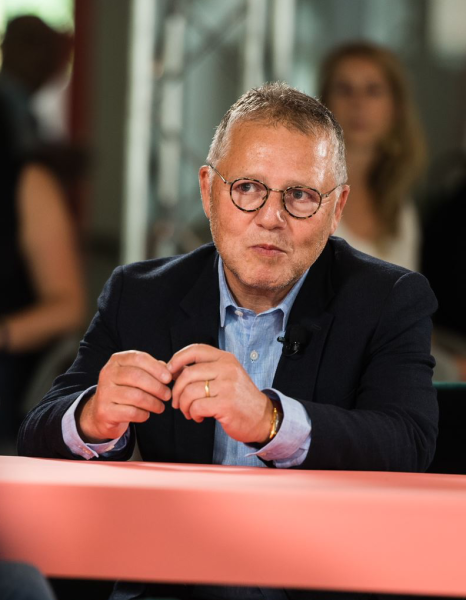
Emmanuel Hirsch: a commitment to medical ethics
Emmanuel Hirsch, professor emeritus of medical ethics at Université Paris-Saclay, has devoted his career to the human issues involved in healthcare, biomedical research and health policy. He is a philosopher committed to civic society, advocating a practical and involved ethical approach based on responsibility, consultation and dignity.
Emmanuel Hirsch became involved in medical ethics under the defining influence of Claude Bruaire, a philosopher who initiated innovative thinking on the ethics of medicine and biomedical research. Claude Bruaire supported Emmanuel Hirsch's doctoral research on Morality and Ethics: the Medical Figure at Université Paris-Sorbonne until his death in 1986. Emmanuel Hirsch defended his thesis in 1988 and published it in 1990 with the title Médecine et éthique. Le devoir d’humanité [Medicine and Ethics: The Duty of Humanity].
Field of research and work
The professor's work focused on "critical" situations that confront medicine and society with major dilemmas, such as end of life, neurodegenerative diseases, suffering, states of wakefulness without consciousness and health crises. "So many issues that require decisions based on discernment, justice, solidarity and dignity."
In the 1980s, he became involved in the fight against Acquired Immunodeficiency Syndrome (AIDS), took part in the emergence of palliative care and contributed to the debate that led to the Law of 4 March 2002 on patients' rights and the quality of the healthcare system. His book, Aides. Solidaires [Aides: In Solidarity] (1991, republished in 2024) describes the creation of the association "Aides" and bears witness to its socio-political perspective on the epidemic. He subsequently directed and coordinated various publications on the fight against AIDS, notably as president of Arcat-Sida (1995–1998) and editor of a dedicated TV magazine on France 3. In the same vein, he signed the Ethical charter for research in developing countries with Michel Kazatchkine; this charter was the result of consultations in several African countries and emphasised the need for a collective approach adapted to the realities on the ground and respectful of fundamental rights.
Radio productions and community action
Before launching a formal academic career, Emmanuel Hirsch gained experience at the radio station France Culture from 1983 to 1998. As producer of Vivre l'éthique [Living ethics] and coordinator of Chemins de la connaissance [Paths to knowledge], he was actively involved in disseminating knowledge to a wide audience. His involvement in the debate was enhanced by his desire to be close to those living with illness, disability or a loss of independence. It is important to "listen to those moments when life becomes fragile in order to understand what inspires a sense of care and solidarity within us."
From the AP-HP ethical reflection Space to the rethinking of bioethics
In 1995, Alain Cordier, then director of Assistance publique-Hôpitaux de Paris (AP-HP), asked Emmanuel Hirsch to create a new ethics body. Together with doctor Didier Sicard, he founded the AP-HP ethical reflection Space, a concept recognised by the bioethics Law of 6 August 2004. This model was innovative in its participatory approach, its broad consultations and its consideration of experiential knowledge. It promoted true "health democracy" so that all stakeholders, including patients and their families, could share the values of care. Emmanuel Hirsch continued to raise awareness and provide training until he left the organisation in 2022. In 2010, he was also appointed director of the national ethical reflection centre on Alzheimer's disease, which was later expanded to include neurodegenerative diseases. Its initiatives are based on knowledge sharing within thematic groups, the drafting of charters, the organisation of summer schools, the development of resolutions aimed at transforming social attitudes to health issues and vulnerabilities, and strengthening solidarity.
Academic growth and institutional recognition
In 2000, Université Paris-Sud (now Université Paris-Saclay) asked Emmanuel Hirsch to become associate professor of medical ethics. He founded a dedicated research department, before being appointed professor in 2006. He built up a network that combines theoretical reflection and field experimentation, through institutional degrees, Master's degrees and PhDs. The AP-HP ethical reflection space subsequently became a World Health Organisation (WHO) collaborating centre for bioethics, and Emmanuel Hirsch became involved in the Distalz laboratory of excellence (LabEx) dedicated to neurodegenerative diseases. He was also involved in founding the Revue française d'éthique appliquée [French Journal of Applied Ethics], a key publication for disseminating advances in this field.
Poléthis and the evolution of research practices
In 2018, Gilles Bloch, then president of Université Paris-Saclay, entrusted Emmanuel Hirsch with the initial development and then presidency of Poléthis, the research ethics and scientific integrity council. He collaborated with law professor Frédérique Coulée to provide PhD candidates with a solid education in science and research ethics and develop a dynamic programme of symposia. Some meetings led to collective publications: De nouveaux territoires pour l’éthique de la recherche [New frontiers for research ethics] (2021) and Sciences et pandémie : quelle éthique pour demain ? [Science and pandemics: what ethics for tomorrow?] (2023).
Following on from these initiatives, Emmanuel Hirsch helped to analyse the challenges raised by artificial intelligence in the healthcare field. As a member of the operational ethics committee and vice-president of the national institute of e-health, he took an interest in the social, human and ethical impact of technological innovations. "Anticipating and supporting developments in the field of bioethics or public health issues is one of the characteristics of an ethical approach that serves the common good."
Openness to global health and solidarity
Since 2023, Emmanuel Hirsch has been head of ethics at the Emeis group, which manages care homes for the elderly and people with disabilities, as well as units dedicated to rehabilitation and psychiatric disorders. He also chairs the ethics council of the Rafaël Institute, participates in discussions at the national academies of medicine and surgery and continues his involvement in the field of neurodegenerative diseases on the operational committee of the Alzheimer's Foundation.
His involvement can also be seen in the creation of the Democracy, ethics and solidarity collective in May 2024, whose opinion paper Fins de vie : les enjeux d'une loi en faveur d'une mort programmée [End of life: the challenges of a law in favour of planned death] was published in April 2025 and further developed in Fin de la vie. Les devoirs d’une démocratie [End of life. The Duties of a Democracy], published in May 2025.
A journey inspired by "kindness"
Throughout his career, Emmanuel Hirsch has combined writing with action, believing that ethical reflection must resonate with everyone's daily life. He was the coordinator of Pandémie 2020. Éthique, société, politique [2020 pandemic. Ethics, society, politics] (published at the start of the health crisis) and author of Une éthique pour temps de crise (Ethics for times of crisis, 2022). "I see myself as a researcher in ethics that is not only applied but also fully involved, sometimes working on the margins where societal issues are too often overlooked, even though they challenge us in our democratic responsibilities. For me, the ethics of care and support must include reflection on politics, shared living and what makes a society. In this sense, our university must set an example and produce knowledge, skills and expertise that serve collective values more than ever. With hindsight, I accept what I call my ‘ethical activism’ and I am proud to be an emeritus professor at Paris-Saclay; it engages me and strengthens my determination to take action."
His latest book, Anatomie de la bienveillance. Réinventer une éthique de l’hospitalité [Anatomy of kindness. Reinventing the ethics of hospitality] (Éd. du Cerf, May 2025) continues this theme, with theory and practice remaining interlinked in the service of shared responsibility and the common good.
